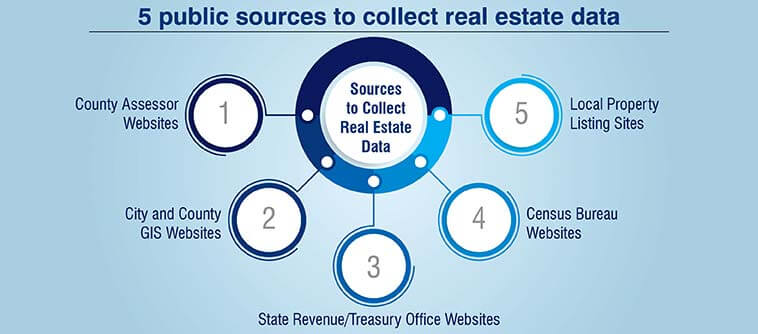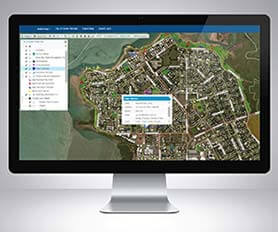10 Powerful eCommerce Data Collection Strategies & Examples
Public property sources carry the assurance of credibility and accuracy, making them indispensable for real estate data collection. How effectively you identify the right data sources and harness their potential, will define the quality of your real estate databases.
Property data in the public domain sets the baseline for your real estate data sets. They guide your quest to increase accuracy and quality because your exclusive real estate databse need to offer more value than what is freely available. They are very useful in the validation of property data. Mostly run by governments/trusts/NGOs, they prove to be comprehensive sources of legal records of transactions and ownerships.
The issue is there are too many of these sources, and one can easily get lost in overwhelming heaps of information. So, to make things easy for you, we have shortlisted the 5 most useful tracks to pursue when searching for property data from public sources.
For real estate data aggregators as well as real estate data companies, it’s important to have credible information sources to pull data from, for their marketing campaigns. It also helps their data-driven decision-making strategies to multiply profits, increase customer satisfaction, and mitigate market risks. It’s a proven fact that accurate and timely real estate data aggregation builds powerful marketplaces.
Free real estate data sources are reliable general repositories of statistics and related property data. Some of these sources are run by the federal government like data.gov and others are provided by public or private institutions.
Government land and property records provide the ground truth for legalities. However, data available from private institutions include the owner’s name, address, age, occupation, and other basic property-related details.
Information found on authority websites like US Census Bureau or county websites serve as the legal truth until established otherwise in court. Thus, data from these public sources are needed to authenticate existing real estate data sets.
Data collection from free public sources provides them with insights into the real estate market, competitors, customer expectations, and status of certain areas and populations. It also helps them identify available estates, analyze consumer needs, and optimize prices.
Here are some public real estate data sources that real estate data aggregators scour to populate MLS sites and property listings. All have their uses in creating value-added and comprehensive real estate datasets.


One of the biggest public sources for real estate data collection includes County Assessor Websites which contain property and planning information in their respective counties. One can even visit state-wise county information like counties.org and mappr.co which includes comprehensive info about the counties.
What do the sites provide?
How does this help real estate data aggregators?
County websites are the best possible public sources of real estate data collection and housing information. The counties handle deeds related to private properties, public parks, planning services, waste disposal, and more. Specific codes and policies are also part of the information on the portals. Web scraping has several key benefits to offer the real estate industry. It helps aggregators to collect bulk real estate data about housing and construction trends from such sources.
In a similar project, Hitech BPO collected property records from 195 counties across 3 US states for a Tennessee- based data solutions provider.

These are government websites that have earth data holdings, and the sites include maps, satellite images, and aerial pictures, and historical data of previous decades. The portal includes an annual subscription for understanding an area’s property values.
The site also monitors and predicts evolving Earth-system interactions that ensure decision-makers have the required information to work around timeframes and patterns.
These sites provide bulk real estate data with ancillary information on frequent natural hazards, resources, and environmental health. Climate and land-use change is a major part of the data research for this site.
What does the site provide?
How does the data from this source help real estate, data aggregators?
Real estate aggregators can utilize the data from the portal to understand the geological patterns of a location, housing value trends, climatic conditions, and risks.

Along with an overview of the taxation system, the State Revenue and Treasury websites provide a look into taxpayers and their demographics. The database contains information about property tax paid by individuals indicating individuals who are well off. Also, it is easy to find out town areas that host middle-class and rich residents.
The income tax return records help to assess the per capita income of a location along with the social perspectives, opportunities, and financial growth of the residents. These are estimated on the basis of legally available data on the 1040s or W-4s filed by residents. IRS Tax Records Database is one such website used to collect real estate-related data.
What does the site provide?
How does the data from this source help real estate, data aggregators?
Real estate data aggregators can use the data to understand wealth-based trends and taxation trends of a location. The information indicates the prosperity ratio for new homebuyers and offers the knowledge as part of its bulk real estate data.

Census bureau websites pool and generate data about the population, social, and economic trends of the country. The bureau’s findings and associated funding help diverse states, local communities, and businesses to strategize their operations and take informed decisions.
The information impacts housing builders who participate in real estate development based on these indicators. It helps buyers to explore properties based on the living standards, communities, and economic outlook of a region or locality.
The AHS stands for the American Housing Survey. It is conducted by US Census Bureau and sponsored by the Department of Housing and Urban Development (HUD). It offers a complete information about the national housing survey for factors like housing facilities, the physical condition of the apartments, home improvement trends, and so on.
Similarly, Office for National Statistics collects, analyzes and disseminates statistics about the UK’s economy, society, population, living standards, property, planning, and much more. Aggregators can use the data to narrow down homes that have pests in a location, resilience during pandemics, differences in fuel usage for comparison, etc.
What does the site provide?
How does the data from this source help real estate, data aggregators?
The data on Census Bureau websites includes size, age and type of homes, home values, rents and mortgages, housing vacancies, residential financing, and more. Each of these factors gives real estate aggregators, corresponding data for each property that enhances the quality of the listings and provides relevant insight to prospective buyers.
The Census Bureau data also offers insight and assessment of housing conditions within a location and helps buyers with grades based on living standards. The housing costs, neighborhood information, and fuel usage within a locality provide buyers with a detailed understanding of what it means to live in that area. It provides MLS sites with data to chart out graphs and statistics.

These portals make it easy for real estate data aggregators and licensed real estate agents to search for and find available real estate properties. They also list the best companies that can assist in securing prompt real estate transactions. Some of these sites include:
MLS is a real estate advertising and listing service company that helps realtors find real estate listings for sale. It features information on foreclosures, new construction, and different real estate classes. The site hosts information that lists homes for sale, acreage, lots, land, and investment properties.
What does the site provide?
How does the data from this source help real estate data aggregators?
The portal features a selection of foreclosed and new properties and helps real estate aggregators to get updated real estate information. It also hosts relevant agents who help prospects buy and sell real estate. One can find brokers, agents, and other real estate entities to make sound property investments.
B. Realtor.com
The portal provides comprehensive real estate property listings and loan options, along with appraisers for properties. It also presents options for buyers to buy, sell, rent, lease, or mortgage properties, along with other commercial services that are connected to property purchases.
The portal is powered by the National Association of Realtors (NAR) which comprises a plethora of residential and commercial brokers, salespersons, appraisers, and counselors of the real estate industry. They belong to 1200+ boards and territory associations with registered real estate professionals. They have a membership mark of REALTOR®, used to identify members who subscribe to their strict code of ethics.
What does the site provide?
How does the data from this source help real estate data aggregators?
The portal provides aggregators with home prices and the attributes of the property, comparison charts, and other ancillary housing-related information for each US-based location.
This portal provides comprehensive information on pre-foreclosures, foreclosures, bankruptcies, city-owned and rental properties, and tax liens for each US county. This is one of the few real estate data companies that aggregate the best foreclosure deals for buyers seeking cheap homes. The site also shows the potential profit involved for buyers in seeking and using these deals.
What does the site provide?
How does the data from this source help real estate data aggregators?
MLS sites can benefit from the aggregated data related to foreclosed properties throughout US, with estimated rental value, spatial attributes, and home value trends for each location.
D. Zoopla
The portal provides information on over a million properties for customers. They provide tools that let clients filter results as they need. They also provide reliable house price estimates to help customers get the best deals.
What does the site provide?
How does the data from this source help real estate data aggregators?
It provides real estate data aggregators with up-to-date data and insights into housing trends in any UK location. It allows a thorough analysis of the viability of property purchases and insight for new buyers. It also helps to find agencies that can help them with construction supplies and expertise.
It is one of the UK’s leading property websites. The site helps property hunters in the middle and upper tiers of the market find their next home with listings advertised by the top estate and letting agents.
What does the site provide?
How does the data from this source help real estate data aggregators?
The portal displays the dynamics that shaped the housing market year-on-year.
Real estate data collection from free sources is not as easy as it sounds. MLS sites need specific data sets that could help buyers look for properties aligned with their budget and location. They also looking for ancillary real estate data sets that share crime statistics, demographics, public transport amenities, weather conditions, and more. Ideally, there are some tasks that real estate data aggregators should automate to collect real estate data.
There are umpteen challenges in collecting data from real estate data companies that these sources present, such as:
Hitech BPO sources property data from over 1,000 small and medium MLS sites and third-party data sources from across different geographies. The firm understands how to collect real estate data by employing custom bots and scheduled crawlers. They accurately fetch property features, geocoded data, etc., even from free public sites, as part of their real estate data collection activities.
The company carries out extensive data aggregation services aligned with industry best practices to normalize and clean the data. With a talented data aggregation experts and MLS domain professionals, Hitech BPO has a strong track record of providing enterprise-level MLS aggregation services.
Getting real estate information from public sources is a challenge for data aggregators that they can’t avoid. When considering how to get real estate data, they need to use the right sources.
The list of real estate data sources mentioned here presents large-scale information related to real estate along with ancillary information that could aid prospective buyers and sellers.
If you are a real estate website owner looking for top-notch real estate data scraping services, Hitech BPO can take the worries off your mind. Shoot us a mail and we’d get back within 24 hours.
What’s next? Message us a brief description of your project.
Our experts will review and get back to you within one business day with free consultation for successful implementation.
Disclaimer:
HitechDigital Solutions LLP and Hitech BPO will never ask for money or commission to offer jobs or projects. In the event you are contacted by any person with job offer in our companies, please reach out to us at info@hitechbpo.com
Leave a Reply